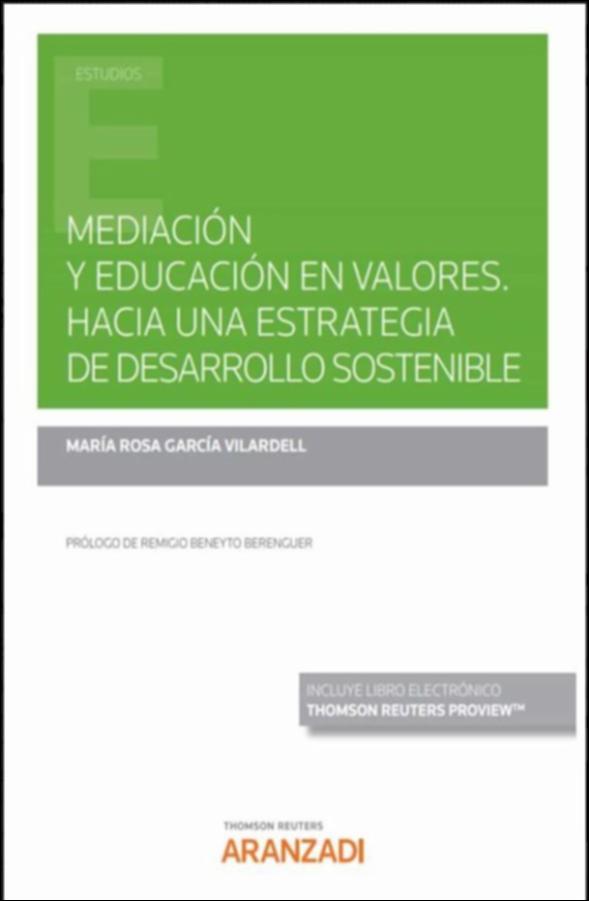Please use this identifier to cite or link to this item:
http://hdl.handle.net/10637/16368Mediación y educación en valores: hacia una estrategia de desarrollo sostenible
| Title: | Mediación y educación en valores: hacia una estrategia de desarrollo sostenible |
| Authors : | García Vilardell, María Rosa |
| Keywords: | Desarrollo sostenible; Sustainable development; Organización de mediación; Mediation organisation; Etica; Ethics |
| Publisher: | Thomson Reuters Aranzadi |
| Citation: | García Vilardell, M.R. (2021). Mediación y educación en valores: hacia una estrategia de desarrollo sostenible. Pamplona: Aranzadi |
| Abstract: | En el año 2015 los líderes mundiales adoptaron un conjunto de objetivos globales de desarrollo sostenible (ODS), 17 exactamente, para asegurar la prosperidad para todos como parte de una nueva agenda de desarrollo sostenible, y los incluyeron en su Agenda para el año 2030. Garantizar una educación inclusiva de calidad y la promoción de sociedades justas, equitativas y pacíficas, son dos de los objetivos suscritos.
Nuestro Texto Constitucional configura un modelo de educación que tiene como finalidad el pleno desarrollo individual del sujeto, y también su inserción en sociedad, y más concretamente en una sociedad específica, definida por características muy precisas. Por ello, todo ser humano, independientemente de su edad, raza o condición, por poseer dignidad de persona, tiene un derecho inalienable a una educación que responda al propio fin, al propio carácter, a la libre formación de la propia conciencia, y que se acomode a la cultura y tradiciones del país y, al mismo tiempo, se abra a las relaciones con otros pueblos.
Una educación de calidad es parte integral del desarrollo sostenible y un facilitador clave de este. Y, en esta dirección, la mediación como mecanismo para la resolución del conflicto, o mejor, como gestión positiva del conflicto, ofrece grandes posibilidades para lograr la formación de ciudadanos respetuosos, dialogantes, buscadores del consenso y capaces, por tanto, de transformar y mejorar la sociedad, y precisamente por ello debería ser parte de la educación, en todos los niveles. In 2015, world leaders adopted a set of global sustainable development goals (SDGs), 17 exactly, to ensure prosperity for all as part of a new sustainable development agenda, and included them in their Agenda for the year 2030. Guaranteeing quality inclusive education and the promotion of just, equitable and peaceful societies are two of the subscribed objectives. Our Constitutional Text configures an education model that aims to achieve the full individual development of the subject, and also its insertion into society, and more specifically in a specific society, defined by very precise characteristics. Therefore, every human being, regardless of their age, race or condition, because they possess dignity as a person, has an inalienable right to an education that responds to their own purpose, their own character, to the free formation of their own conscience, and that adapts to the culture and traditions of the country and, at the same time, is open to relations with other peoples. Quality education is an integral part of and a key enabler of sustainable development. And, in this direction, mediation as a mechanism for conflict resolution, or better, as positive conflict management, offers great possibilities for achieving the formation of respectful citizens, dialogue-seekers, consensus-seekers and capable, therefore, of transforming and improve society, and precisely for this reason it should be part of education, at all levels. |
| Description: | Este recurso no está disponible en acceso abierto por política de la editorial. |
| URI: | http://hdl.handle.net/10637/16368 |
| ISBN: | 9788413914480 |
| Issue Date: | 2021 |
| Center : | Universidad Cardenal Herrera-CEU |
| Appears in Collections: | Dpto. Ciencias Jurídicas |
Items in DSpace are protected by copyright, with all rights reserved, unless otherwise indicated.


